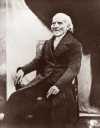 Hahnemann was a German physician who created the form of alternative medicine known as homeopathy. Unsatisfied with the state of medicine at the time, Hahnemann looked for an alternative. Struck by the similarity of the symptoms quinine produces in healthy individuals to those of the disorder it cures, he theorized that “like cures like” and that drugs which produce the same symptoms as certain diseases should be used in small doses to treat those diseases. Why did he discourage drinking coffee? Discuss
Hahnemann was a German physician who created the form of alternative medicine known as homeopathy. Unsatisfied with the state of medicine at the time, Hahnemann looked for an alternative. Struck by the similarity of the symptoms quinine produces in healthy individuals to those of the disorder it cures, he theorized that “like cures like” and that drugs which produce the same symptoms as certain diseases should be used in small doses to treat those diseases. Why did he discourage drinking coffee? Discuss
Source: The Free Dictionary
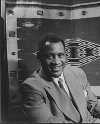 Paul Robeson was an American stage actor, singer, and political activist. The son of a runaway slave who became a minister, Robeson graduated from Rutgers, where he was an All-American football player, and then from Columbia University law school, before turning to theater. Known for his superb bass-baritone, he gained fame for his stage role in Othello. He later became an outspoken activist on issues such as racial justice and international peace. Why was his passport revoked in 1950?
Paul Robeson was an American stage actor, singer, and political activist. The son of a runaway slave who became a minister, Robeson graduated from Rutgers, where he was an All-American football player, and then from Columbia University law school, before turning to theater. Known for his superb bass-baritone, he gained fame for his stage role in Othello. He later became an outspoken activist on issues such as racial justice and international peace. Why was his passport revoked in 1950? 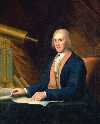 Rittenhouse was a renowned American astronomer, inventor, mathematician, surveyor, and the first director of the US Mint. A clockmaker by trade, he developed many mathematical instruments, as well as perhaps the first telescope in the US. He later used tools he created to establish several state lines as well as part of the boundary known as the Mason-Dixon Line. What is said to have happened to Rittenhouse in 1769 as he observed the rare transit of Venus that he had long anticipated?
Rittenhouse was a renowned American astronomer, inventor, mathematician, surveyor, and the first director of the US Mint. A clockmaker by trade, he developed many mathematical instruments, as well as perhaps the first telescope in the US. He later used tools he created to establish several state lines as well as part of the boundary known as the Mason-Dixon Line. What is said to have happened to Rittenhouse in 1769 as he observed the rare transit of Venus that he had long anticipated? 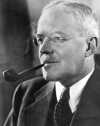 Born into America’s political establishment, Dulles became an extremely influential governmental figure, eventually serving eight years as the US Director of Central Intelligence. He resigned in 1961, after a series of controversial events—most notably the failed Bay of Pigs Invasion of Cuba—aroused criticism of the Central Intelligence Agency. Two years later, he was appointed to the Warren Commission to investigate the assassination of President John F. Kennedy. Who was his famous brother?
Born into America’s political establishment, Dulles became an extremely influential governmental figure, eventually serving eight years as the US Director of Central Intelligence. He resigned in 1961, after a series of controversial events—most notably the failed Bay of Pigs Invasion of Cuba—aroused criticism of the Central Intelligence Agency. Two years later, he was appointed to the Warren Commission to investigate the assassination of President John F. Kennedy. Who was his famous brother? 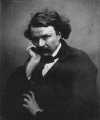 Gaspard-Félix Tournachon, otherwise known as Nadar, was a pioneering French photographer and writer. He invented the photo-essay, but his prose essays and novels brought him greater fame in his day than his photographs. Today, however, he is known for his superb portraits of the Paris intelligentsia, who frequently gathered at his studio, and his aerial images of Paris, which were the first photographs ever taken from the air. What famous literary figure did Nadar photograph on his deathbed?
Gaspard-Félix Tournachon, otherwise known as Nadar, was a pioneering French photographer and writer. He invented the photo-essay, but his prose essays and novels brought him greater fame in his day than his photographs. Today, however, he is known for his superb portraits of the Paris intelligentsia, who frequently gathered at his studio, and his aerial images of Paris, which were the first photographs ever taken from the air. What famous literary figure did Nadar photograph on his deathbed? .jpg) Thomas Hobbes was an English philosopher and political theorist whose famous 1651 book Leviathan profoundly affected political-legal theory in general and influenced the early formation of US law in particular. In Leviathan, Hobbes argues that man is by nature a selfishly individualistic animal and advocates absolutist government as the only means of securing civil society. A lack of such authority, he postulated, would lead to bellum omnium contra omnes, which means what?
Thomas Hobbes was an English philosopher and political theorist whose famous 1651 book Leviathan profoundly affected political-legal theory in general and influenced the early formation of US law in particular. In Leviathan, Hobbes argues that man is by nature a selfishly individualistic animal and advocates absolutist government as the only means of securing civil society. A lack of such authority, he postulated, would lead to bellum omnium contra omnes, which means what? 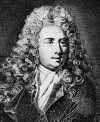 Antoine Galland was a French scholar famed as the first European translator of The Thousand and One Nights. After translating The Tale of Sindbad the Sailor into French in 1701, he embarked on a translation of a 14th-century Syrian manuscript of the tales, filling 12 volumes. Still, mystery surrounds the origins of some of the most famous tales. No Arabic manuscripts of Aladdin and Ali Baba pre-date Galland’s translations, leading some scholars to conclude what?
Antoine Galland was a French scholar famed as the first European translator of The Thousand and One Nights. After translating The Tale of Sindbad the Sailor into French in 1701, he embarked on a translation of a 14th-century Syrian manuscript of the tales, filling 12 volumes. Still, mystery surrounds the origins of some of the most famous tales. No Arabic manuscripts of Aladdin and Ali Baba pre-date Galland’s translations, leading some scholars to conclude what?  Regarded as the greatest actor of his generation and one of the most influential actors of all time, Marlon Brando was known for his naturalistic performances. He achieved fame on Broadway in A Streetcar Named Desire, later starring in the film version. Considered the foremost practitioner of the New York Actors Studio style of “method” acting, Brando earned Academy Awards for his roles in On the Waterfront and The Godfather. Why did he refuse the latter award?
Regarded as the greatest actor of his generation and one of the most influential actors of all time, Marlon Brando was known for his naturalistic performances. He achieved fame on Broadway in A Streetcar Named Desire, later starring in the film version. Considered the foremost practitioner of the New York Actors Studio style of “method” acting, Brando earned Academy Awards for his roles in On the Waterfront and The Godfather. Why did he refuse the latter award? 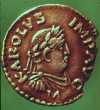 The Carolingian king of the Franks from 768 CE until his death in 814 CE, Charlemagne united most of Western Europe under a single empire for the first time since the Romans, becoming, in 800 CE, the first Holy Roman Emperor. Charles the Great, as he is also known, instituted many judicial and ecclesiastical reforms, promoted commerce and agriculture throughout his empire, made his court a center of learning, and inspired the Carolingian Renaissance. What was notable about his style of dress?
The Carolingian king of the Franks from 768 CE until his death in 814 CE, Charlemagne united most of Western Europe under a single empire for the first time since the Romans, becoming, in 800 CE, the first Holy Roman Emperor. Charles the Great, as he is also known, instituted many judicial and ecclesiastical reforms, promoted commerce and agriculture throughout his empire, made his court a center of learning, and inspired the Carolingian Renaissance. What was notable about his style of dress?  Bismarck was a 19th-century Prussian and German statesman. Under his leadership, Prussia defeated Austria and France, and Germany was united. He was appointed premier in 1862 and became chancellor of the North German Confederation in 1867. When the new German Empire formed in 1871, he became its first chancellor, gaining almost complete control of foreign and domestic affairs and eventually earning the nickname “Iron Chancellor.” What was the Kulturkampf, and why did he encourage it?
Bismarck was a 19th-century Prussian and German statesman. Under his leadership, Prussia defeated Austria and France, and Germany was united. He was appointed premier in 1862 and became chancellor of the North German Confederation in 1867. When the new German Empire formed in 1871, he became its first chancellor, gaining almost complete control of foreign and domestic affairs and eventually earning the nickname “Iron Chancellor.” What was the Kulturkampf, and why did he encourage it?